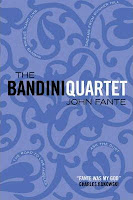 Staff review by Chris Saliba
Staff review by Chris SalibaJohn Fante’s cycle of four novels set during the Great Depression.
The Bandini Quartet comprises four novels by American-Italian writer John Fante, based on the autobiographical character Arturo Bandini. The first three of the novels were written during the 1930s (The Road to Los Angeles was published posthumously, found amongst John Fante's papers.) The final novel, Dreams From Bunker Hill, was dictated to Fante's wife, Joyce, as he was blind with diabetes.
Written in a clean, crisp, unadorned style, frequently shot through with humour and sharp dialogue, the novels have much to say about poverty, being Italian and America during the Depression. More than that, they provide a striking portrait of an aspiring artist and outsider trying to prove their worth in an often crude and cruel society. They are a study of the self in isolation. No other cycle of novels is tinged with so much loneliness and vulnerability, without being mawkish or sentimental. Fante's language is so immediate and clear-sighted The Bandini Quartet reads like it was written only yesterday.
Wait Until Spring, Bandini
First published in 1938, Wait Until Spring, Bandini introduces Arturo Bandini, aged thirteen. He has two younger siblings, Frederico and August. His father, Svevo, is a bricklayer and stone cutter, struggling to make enough to keep his family fed with a roof over their heads. Maria, Arturo's mother, is a strongly religious woman. She is frequently mistreated by a husband who feels his life to be a humiliation.
There is much humour in Wait Until Spring, Bandini, especially the descriptions of Maria's mother, the ogre-like Donna Toscana. Her relentless criticisms of Maria's household and circumstances, mixed with her own grotesque appearance, makes for a brilliant, Rabelaisian comic portrait.
The novel ends on a note of pathos. Arturo is in love with fellow classmate, Rosa Pinelli, but is too shy and unsure of himself to express his admiration.
The Road to Los Angeles
Arturo Bandini is eighteen-years-old and living at home with his mother and sixteen-year-old sister Mona. (There's no mention of male siblings in this novel.) He now considers himself a writer and dreams of being famous.
The tone is of a flippant and confident Arturo. He is a mercurial character and speaks in a grandiloquent, over the top voice as he dreams out loud of his assured greatness as a novelist. The reality, however, is that he must work a dirty job at a seafood cannery. (The sections that deal with the cannery are some of the best and funniest in the novel.)
This is the story of a young working class man with dim prospects, trying to survive during the Great Depression.
How sad that this fine novel was not published during Fante's lifetime.
Ask the Dust
Arturo Bandini is now a twenty-year-old writer, living by himself in the seedy Bunker Hill area of Los Angeles. He ekes out a meagre existence in a dingy hotel. His only claim to fame is the publication of a short story, “The Little Dog Laughed”, in a magazine. Despite his straitened circumstances in depression era America, Bandini is exultant, for he believes he is on the cusp of great literary fame.
Much of the comedy in Ask the Dusk derives from Bandini's delusions of grandeur. He's surrounded by squalor, filth, poverty and misery, yet he speaks in exalted and flowery language about his greatness as a writer. Those around him don't see him this way. When he tries to give away copies of the magazine in which his story has appeared, no one is interested. The only person who takes him seriously as a writer is a fourteen-year-old girl who wanders into his hotel room.
Ask the Dust feels like it prefigures much classic American literature. The mental collapse of the waitress Camilla Lopez reminds one of Sylvia Plath's The Bell Jar, as does Fante's simple, poetic language.
Dreams from Bunker Hill
The last Bandini novel, written when Fante was blind with diabetes. He dictated it to his wife, Joyce, during the early 1980s. The novel is pretty much a sequel to Ask the Dust. Bandini is still trying to make it as a writer in Los Angeles. He gets a job as an editor which is short lived. He then works as a screenwriter and meets various interesting film industry characters. The portrait of fellow hack screenwriter Velda van der Zee is a special stand-out. She can't stop dropping names about who she's met and writes terribly cliched screenplays.
Sick of his struggles trying to make it in Los Angeles, Bandini returns to his family's home in Boulder, Colorado. He boasts to his family and friends about this exploits, lies really, that he's a big shot. But once again he's restless. He knows he doesn't fit in, either in Colorado or Los Angeles. What to do? Where to go?
The Bandini Quartet, by John Fante. Published by Canongate. ISBN: 9781841954974 RRP: $29.99
To sign up for our monthly newsletter, featuring new releases, book reviews and favourite articles from around the web, click here.
I am almost finished with the 4th novel in "The Bandini Quartet." I love them all. My fave might be the first one, but each of them is a winner!! So glad I was introduced to Mr. Fante last year!
ReplyDelete